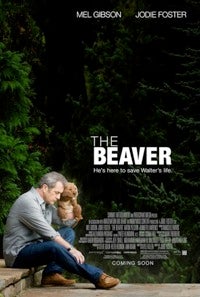indieWIRE takes a few looks at Wednesday night's big premiere, "The Beaver." First, Bryce J. Renninger covers the SXSW screening and Q&A, at which director Jodie Foster called Mel Gibson "the most beloved person" she's ever worked with. (Chow Yun-Fat, she said, is the runner-up.) Anne Thompson does the same, throwing in some personal opinion ("a dark, moving family drama"), film clips and backstory on how Summit shelved the film for half a year in an attempt to "ride out Gibson's crazy tabloid circus." Then critic Eric Kohn reviews the film, which he sums up thusly: "Despite a ludicrous set-up based around one of the most outlandish performances of Mel Gibson’s career, 'The Beaver' is a tame, leisurely drama that neither provides the beleaguered actor with decisive comeback material nor further muddies his tarnished image." His chief qualms have to do with the "subdued tone" and an ending he finds unsatisfying, though he thinks it could do decent business at the boxoffice. (indieWIRE)
 Jeff Wells also weighs in on the film that he once wrote was responsible for his decision to attend SXSW this year. Under a headline that reads "'The Beaver' Is Okay," he calls the film "occasionally amusing but … mostly a sad and red-eyed distressed family drama." If he never works up any enthusiasm for the film, he does conclude, "Gibson deserves points and respect for nailing the Walter role and giving it hell in both senses of the term." (Hollywood Elsewhere)
Jeff Wells also weighs in on the film that he once wrote was responsible for his decision to attend SXSW this year. Under a headline that reads "'The Beaver' Is Okay," he calls the film "occasionally amusing but … mostly a sad and red-eyed distressed family drama." If he never works up any enthusiasm for the film, he does conclude, "Gibson deserves points and respect for nailing the Walter role and giving it hell in both senses of the term." (Hollywood Elsewhere)
The new Mel Gibson movie wasn't the only thing to screen at SXSW on Wednesday – there was also the new Greta Gerwig movie, which in some corners of Austin might even be a bigger deal. The Alison Bagnall-directed "The Dish and the Spoon," says Eugene Novikov, is a relative to "Lost in Translation," an understated story about strangers "making a meaningful but necessarily temporary connection." As for Gerwig, who's gone from the queen of mumblecore to a co-star of the upcoming Russell Brand comedy "Arthur," Novikov says she "can be proud of this lovely detour on her way to bigger things." (Cinematical)
"The Dish and the Spoon," by the way, was one of "at least 10" SXSW narrative features directed by women, a number that Alicia Van Couvering says is double last year's total. She runs down a list of films that, she says, "share very little in the way of common themes": there's the vampire comedy "My Sucky Teenage Romance," the hyper-realistic "Inside America," the semi-autobiographical "Yelling to the Sky" … But two of the films, Van Couvering says, work a common ground in the way they "venture into territory left unexplored by most independent and mainstream films: strong women and the jealousy and rage that occasionally overtakes them." "The Dish and the Spoon" is one of those films, and Sophia Takal's "Green" the other. (Filmmaker Magazine)
Christopher Campbell finds a common thread in three SXSW films, "Attack the Block," "Phase 7" and "The Divide": vague conspiracy theories that tend to point at the government as the source of the troubles ("space apes," a global pandemic and a nuclear attack) that the characters are dealing with. Of course, you could say that "blame the government" is a common thread running through "Inside Job" and and a whole lot of other movies as well, so this is hardly a SXSW kind of thing… (Spout)
Not to be outdone by the other trendspotters out there, Christopher Rosen finds evidence for a new "indie trend" in the SXSW entry "A Bag of Hammers": movies about "kids helping adults find their way in life." He sees it starting with the non-SXSW "happythankyoumoreplease" and "Win Win," but the latest example comes from this week in Austin, in Brian Crano's "apparently charming little indie diversion" about a pair of low-rent car thieves who find an abandoned child. He hasn't actually seen the movie yet, mind you – but on the basis of the trailer, he's excited to do so and ready to do the time-honored journalistic math in which 1+1+1 always equals a trend. (Movieline)

